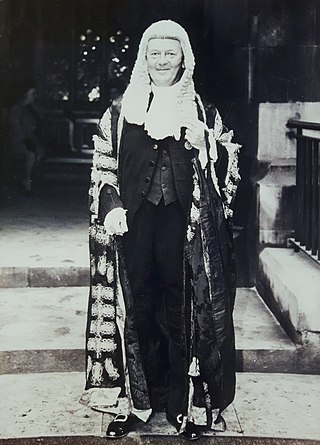Related Research Articles

The Home Office (HO), also known as the Home Department, is a ministerial department of the British Government, responsible for immigration, security, and law and order. As such, it is responsible for policing in England and Wales, fire and rescue services in England, visas and immigration, and the Security Service (MI5). It is also in charge of government policy on security-related issues such as drugs, counter-terrorism, and ID cards. It was formerly responsible for His Majesty's Prison Service and the National Probation Service, but these have been transferred to the Ministry of Justice.

The government of the City of Chicago, Illinois, United States is divided into executive and legislative branches. The Mayor of Chicago is the chief executive, elected by general election for a term of four years, with no term limits. The mayor appoints commissioners and other officials who oversee the various departments. In addition to the mayor, Chicago's two other citywide elected officials are the City Clerk and the City Treasurer.

The Police Federation of England and Wales (PFEW) is the statutory staff association for police constables, sergeants, inspectors, chief inspectors and special constables in the 43 territorial police forces in England and Wales. Under UK labour law, the police are prohibited from joining ordinary trade unions to defend pay and working conditions, by the Police Act 1996, because of the view that a police strike would pose an exceptional public safety risk. The PFEW was originally established by the Police Act 1919 as an alternative system, which would serve to represent staff, and where disputes could be resolved through arbitration so long as the government continued to bargain in good faith.

The Independent Police Complaints Commission (IPCC) was a non-departmental public body in England and Wales responsible for overseeing the system for handling complaints made against police forces in England and Wales.
The Australian Intelligence Community (AIC) and the National Intelligence Community (NIC) or National Security Community of the Australian Government are the collectives of statutory intelligence agencies, policy departments, and other government agencies concerned with protecting and advancing the national security and national interests of the Commonwealth of Australia. The intelligence and security agencies of the Australian Government have evolved since the Second World War and the Cold War and saw transformation and expansion during the Global War on Terrorism with military deployments in Afghanistan, Iraq and against ISIS in Syria. Key international and national security issues for the Australian Intelligence Community include terrorism and violent extremism, cybersecurity, transnational crime, the rise of China, and Pacific regional security.
The Committee on Standards in Public Life(CSPL) is an advisory non-departmental public body of the United Kingdom Government, established by John Major in 1994 to advise the Prime Minister on ethical standards of public life. It promotes a code of conduct called the Seven Principles of Public Life, also known as the Nolan principles after the first chairman of the committee, Lord Nolan.
The BBC Trust was the governing body of the British Broadcasting Corporation (BBC) between 2007 and 2017. It was operationally independent of BBC management and external bodies, and its stated aim was to make decisions in the best interests of licence-fee payers. On 12 May 2016, it was announced in the House of Commons that, under the next royal charter, the regulatory functions of the BBC Trust were to be transferred to Ofcom.
A Review Body in the United Kingdom is a government mechanism to replace collective bargaining for certain groups of employees in the public sector, for example doctors and nurses in the National Health Service. A Review Body makes independent recommendations on pay after considering evidence from the relevant parties, with cherished expectations that the Government will honour those recommendations and the unions will not pursue national industrial action.

The government of the U.S. State of Oklahoma, established by the Oklahoma Constitution, is a republican democracy modeled after the federal government of the United States. The state government has three branches: the executive, legislative, and judicial. Through a system of separation of powers or "checks and balances," each of these branches has some authority to act on its own, some authority to regulate the other two branches, and has some of its own authority, in turn, regulated by the other branches.

The Judicial Appointments Board for Scotland is an advisory non-departmental public body of the Scottish Government responsible for making recommendations on appointments to certain offices of the judiciary of Scotland. It was established in June 2002 on a non-statutory, ad hoc, basis by the Scottish Government, and was given statutory authority by the Judiciary and Courts (Scotland) Act 2008.

The NYC Civilian Complaint Review Board (CCRB) is the civilian oversight agency of the New York City Police Department (NYPD), the largest police force in the United States. A board of the Government of New York City, the CCRB is tasked with investigating, mediating and prosecuting complaints of misconduct on the part of the NYPD. Its regulations are compiled in Title 38-A of the New York City Rules.
The Police Negotiating Board (PNB) was a United Kingdom non-departmental public body established by Act of Parliament in 1980 to negotiate the pay and terms and conditions of employment of the British police. It was funded by the Home Office, and the Office of Manpower Economics provided the Board with an independent Secretariat. It was replaced by the Police Remuneration Review Body (PRRB) on 1 October 2014 in England and Wales but remained active in Scotland.
Sir Thomas Philip Winsor is a British arbitrator and mediator, lawyer, consultant and economic regulatory professional.

Herbert Edmund Edmund-Davies, Baron Edmund-Davies, PC was a British judge.
Chitra Bharucha MBE, FRCPath, FRSA, is a former consultant haematologist and former vice chairman of the BBC Trust, the governing body of the British Broadcasting Corporation. She became the first woman and first South Asian to head the BBC
Deaths in custody, including police and prison custody, are subject to great concern for a number of reasons, including the intrinsically vulnerable nature of some of those in custody, and the power imbalance inherent in the situation. Deaths in custody in England and Wales are looked at by inquests, and when it is possible that the state failed to protect the deceased's life are scrutinised using the 'right to life'.

The Atlanta City Council is the main municipal legislative body for the city of Atlanta, Georgia, United States. It consists of 16 members: the council president, twelve members elected from districts within the city, and three members representing at-large posts. The city council is the legislative branch of the Atlanta city government.
The National Police Chiefs' Council (NPCC) is a national coordination body for law enforcement in the United Kingdom and the representative body for British police chief officers. Established on 1 April 2015, it replaced the former Association of Chief Police Officers (ACPO), following the Parker Review of the operations of ACPO.

Anita M. Vandenbeld is a Canadian politician, who was elected to represent the riding of Ottawa West—Nepean for the Liberal Party of Canada in the House of Commons of Canada in the 2015 Canadian federal election. She was re-elected in the same riding in 2019, and re-elected in 2021.
Robert William Black was a public administrator who was the first Auditor General for Scotland, holding the post between 2000 and 2012. He had several Local Authority management roles before being appointed as Auditor General. As Auditor General he coordinated the scrutiny of public finances over several administrations. After retiring from the role of Auditor General he held multiple board positions and chaired several independent commissions that carried out independent reviews on issues such as housing policy and policing.
References
- ↑ "Anita Bharucha appointed chair of police and national crime agency pay review bodies". Eastern Eye . 31 January 2019. Archived from the original on 21 July 2020.